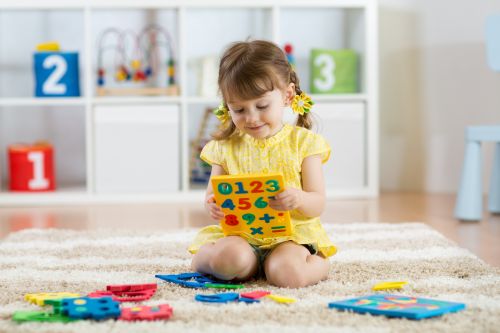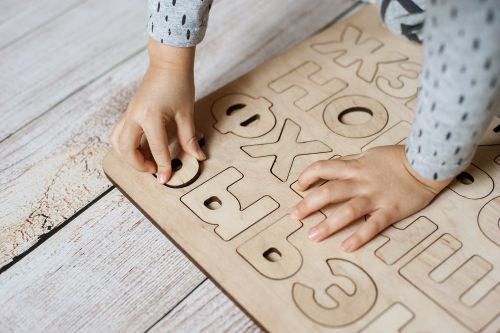

Why do some kids excel in school while others struggle? Why do some students hardly study and still do well, while others barely pass? The surprising answer might be early language learning.
Learning a language early on is an investment in the brain’s development. A child’s brain is like a sponge. It soaks up new information with ease. Kids who learn foreign languages often have better memory, focus, and analytical skills. This leads them to success in all areas of education.
Spis treści:
Brain development and early language learning
The brain’s ability to reorganise and create new connections, known as neuroplasticity, is at its peak in young children. They seem hardwired to absorb new information quickly. Their speed in picking up words, phrases, and grammar is truly impressive.
The idea of a “critical period” (usually from birth to age 7) explains why this happens. During this time, the brain is highly receptive to language learning. Children naturally grasp language without intense study. As they grow older, the brain loses some of its flexibility.
Research published in “Nature Reviews Neuroscience” highlights that early bilingualism increases the density of grey matter in the brain, particularly in areas related to language processing and cognitive control.
What are the key benefits of early language education for a child’s cognitive development?
Learning a foreign language improves memory. Memorising new words, phrases, and grammar rules strengthens the ability to store and recall information. It later aids in learning mathematics and remembering historical facts.
Language learning also hones analytical thinking. Children learn to compare new grammatical structures with what they already know. This skill boosts their mathematics performance as they become better at spotting patterns and connections when solving problems.
Learning a language teaches kids to think in different ways and increases their mental flexibility. When they face a challenge in one language, they can always switch to another linguistic structure. This ability to think from multiple angles helps them tackle challenges at school and in everyday life.
Research published in the “Journal of Experimental Child Psychology” shows that bilingual children outperform their monolingual peers in executive functions. They excel in problem-solving, multitasking, and concentration.



Early language acquisition
Children who start learning a language at a young age often perform better across various school subjects. Are you surprised? Maybe at first, but when you have a closer look, it makes perfect sense.
Learning a new language activates parts of the brain that are also involved in other academic skills. The impact on school subjects comes from enhanced cognitive abilities and a more profound understanding of instructions and texts.
Language learning shapes a child’s social and emotional skills. It helps them communicate clearly and build relationships with peers and adults. Kids who learn foreign languages frequently excel in social interactions because they know how to express their thoughts and feelings understandably. This clear communication fosters the development of empathy.
When a child learns a second language, he better grasps that people have different perspectives and ways of thinking. Accepting diverse expressions of thoughts and feelings leads to deeper empathy. The child becomes more open to other cultures and viewpoints.
Bilingual children develop cultural awareness. As children pick up a new language, they also learn about the culture behind it. A world of diversity opens before them. Other traditions, customs, and lifestyles do not seem threatening but enriching.
Children are more willing to take risks in speaking and are less afraid of making mistakes, which leads to better overall communication skills. This is supported by research published in the “Journal of Child Language”, which found that bilingual children are more engaged in social interactions and have stronger storytelling abilities.
Long-term benefits of speaking a foreign language
Early foreign language learning is linked to delaying cognitive decline in older adults. A study published in “Neurology” found that bilingual individuals showed symptoms of Alzheimer’s disease on average 4.5 years later than monolinguals. Managing two languages provides continuous cognitive stimulation. In simple terms, it keeps the brain healthy.
Cognitive skills gained from early language learning make it easier to pick up additional languages later in life. The grammar and vocabulary of two languages (your native and learned one) help in forming associations when mastering new concepts.
Practical advantages of language skills
Learning a language early is an investment in your future career. Being fluent in more than one language is highly valued in today’s job market. Employers are increasingly tracking down candidates who can communicate with international clients, partners, and teams.
Mastering a foreign language early on boosts your chances of landing desirable positions in companies operating globally. Bilingualism sets candidates apart and gives them an edge in recruitment.
Developing language skills as young learners
Early language development is most effective when the right teaching methods are used. One of the most successful techniques is immersion, where children are surrounded by a foreign language. They use it in everyday situations—at preschool, during playtime, and even in parent-child interactions.
In this environment, children absorb the language naturally, just like they do with their native tongue. Learning through play, using games, songs, and interactive exercises, is also highly effective. Kids learn by doing, what makes the process enjoyable for them.
Parents can introduce a foreign language into daily activities. Reading books, watching cartoons, and singing songs in a different language add new words and grammatical structures to the child’s everyday life. These activities encourage him to discover new ways to communicate.



Speed up your language development
Would you like to learn a foreign language quickly? Have you missed the chance to do it as a child? Traditional methods, like studying with a textbook and occasional lessons, demand a lot of time and self-discipline.
If you are aiming for fast progress, invest in professional support. Our language school offers programs tailored to your needs, no matter your level.
Learning Spanish, French, or Italian in a group with an experienced instructor is one of the best approaches. Classes are held in small groups. You will get regular practice in speaking, listening, and writing in a supportive environment. This accelerates language acquisition. Plus, we offer access to interactive online materials so you can reinforce your newly acquired knowledge at home.
Do not wait until a lack of knowledge becomes a barrier in your career or travels. With our courses, you will master the language faster than you think. After just a few weeks, you will notice significant improvement and newfound confidence in using a foreign language. Sign up now and speed up your path to fluency.

